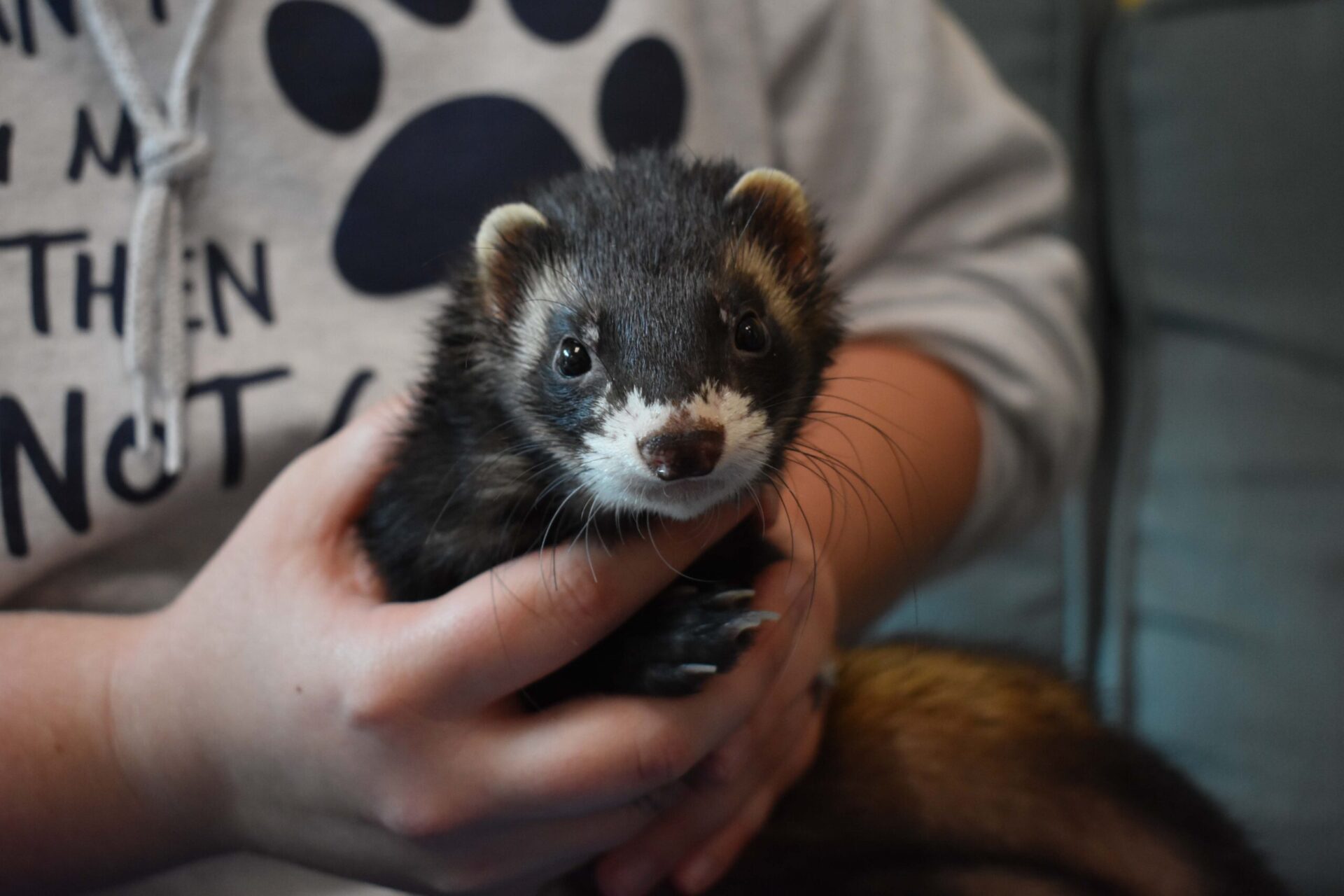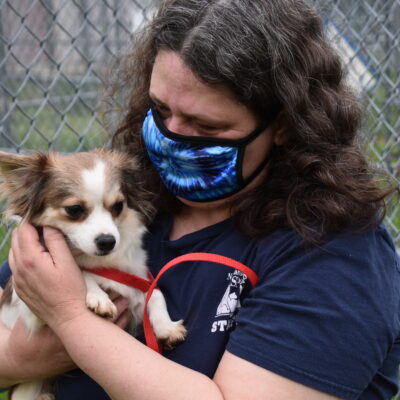General Considerations:
- Ferrets are affectionate and can bond with their owner, making them fun and lovable pets.
- Ferrets are quiet much of the day and they tend to sleep a lot but can be very playful at other times of the day.
- They are intelligent and like to be challenged. They enjoy puzzle and problem-solving games.
- Each ferret has its own unique personality with personal likes and dislikes.
- Spay and Neuter surgery for ferrets is generally routine. Speak with the rescue or shelter you are adopting from and ask if the ferret has been altered.
- Ferrets can be litter box trained. They can be reliable but do expect a few accidents.
- They enjoy exercise and can be brought outside on a well-fitting and secure ferret harness. *Note: Ferrets should never be allowed outside unless they are on a harness.
- Ferrets should be regularly seen by a veterinarian that specializes in small animals.
- In the state of New Hampshire, all ferrets must be vaccinated against rabies and kept up to date on their vaccination. Your veterinarian may also recommend a distemper vaccine.
Life Expectancy:
- Most ferrets will life for 8 to 11 years.
Housing and Bedding:
- You will need to have a good size cage that is ferret proof. There are many commercially available ferret cages in pet supply stores and online. If you are purchasing a used cage, be sure to carefully inspect it to ensure all doors and latches work properly. Be sure to clean and disinfect any used cages thoroughly before moving your pet in.
- Most cages have multiple levels, allowing the ferret to climb and move around.
- Soft paper bedding is suitable for the bottom of the ferret cage. Avoid wood shavings.
- You may wish to include a hidey box, ferret hammock and litter tray.
- Avoid placing the cage in a drafty area or in an area that get very warm. Keep away from heat sources or direct sunlight.
- Ferrets should not spend all day and night in their cage. You will need to plan to let them out for several hours a day for play and exercise.
- Ferrets can easily get into trouble due to their intense curiosity and size.
- Take care to fully ferret proof any area you will be letting them into. The easiest way to do this is choose one room. If you can’t do this, try to block off an area of the home that you can reliably ferret proof.
- Ensure they have no access to outside. Ferrets can tear through window screens and fit through very small holes in doorways, windows, ductwork (heating/cooling/dryer vent), plumbing access and more!
- Keep ferrets away from appliances. They can squeeze and hide, get stuck, chew electrical wires, or become injured when the appliance is turned on.
- Check laundry BEFORE putting it in the washing machine as a ferret can hide among laundry and clothes.
- Keep them away from bathrooms and toilets.
- Be sure to put away all medication and human food that they could gain access to.
- There are many more considerations! Check a ferret care website or guidebook for more things to consider when ferret-proofing your home!
Supplies:
- Cage
- Paper bedding
- Litter tray and pine or paper-based litter
- Ceramic bowls for food
- Gravity water bottle with spout
- Enrichment items – puzzle toys, plastic balls designed for ferrets, knotted rope, empty paper bags, cardboard boxes, ferret safe trinkets such as old keys or slippers. (Avoid soft plastic or rubber like material as ferrets will chew this up.)
- Ferret hammock or bed
Food and Water:
- Ferrets have a very high metabolism and need to eat every 3-4 hours.
- Ferrets are carnivores. Their diet needs to be high in protein and animal fat.
- Formulated diets are best to ensure proper nutrition. Be sure to read the feeding instructions on the bag.
- Treats and supplements consisting of meat, eggs and fish are good choices.
- Pet ferret treats are also available to buy from pet supply stores.
- Avoid grains as it can disrupt their digestive system.
Grooming and Care:
- There are a variety of potential health issues in ferrets. The most common is an adrenal gland disease that is serious, but often easily treatable.
- Be sure to take your ferret to a veterinarian that specializes in small animals for an annual visit and keep your ferret up to date on their rabies vaccination.
- Ferrets do need owner’s assistance with regular grooming needs.
- Ferrets will need their nails trimmed. Watch YouTube videos or consult a ferret care website or guidebook for the proper method for trimming your ferret’s nails.\
- Consider brushing your ferret’s teeth weekly. As their diet consists of animal protein and fat, their teeth can be subject to plaque and decay and regular brushing will help to ensure good dental health.
- Many ferrets to have a musky smell. However, they do groom themselves and keep themselves clean. You can give your ferret a bath occasionally, depending on your veterinarian’s recommendation, using formulated shampoos specifically for ferrets. They do not need to be bathed often as removing their natural oils may result in overproduction of oils and a stronger odor could result.
Fun Facts:
- A baby ferret is called a kit.
- A group of ferrets is called a business.
- Ferrets are the third most popular pet in the US after cats and dogs.
- When a ferret is excited, it can often do a “dance” which is a series of sideways jumps and hops.
- Sometimes, a ferret will wag its tail when it is happy.


